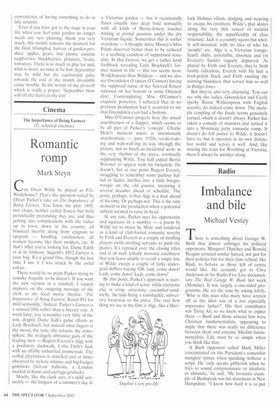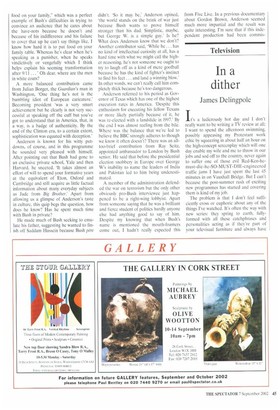Imbalance and bile
Michael Vestey
There is something about George W. Bush that almost unhinges his political opponents. Margaret Thatcher and Ronald Reagan aroused similar hatred, not just for their policies but for their firm refusal, like Bush, to behave as those left of centre would like. He certainly got to Clive Anderson in his Radio Five Live documentary The Real George W. Bush last week (Monday). It was largely a one-sided programme. He set the tone by asking loftily, 'Who is this man who many have written off as the idiot son of a not especially impressive father?' His first contributor was Tariq Ali, so we knew what to expect there — Bush and those around him were Christian fundamentalists, appearing to imply that there was really no difference between them and extreme Muslim fundamentalists. Life must be so simple when you think like that.
A Bush opponent called Mark Miller concentrated on the President's somewhat mangled syntax when speaking without a script. He 'only speaks gibberish when he tries to sound compassionate or idealistic or altruistic,' he said. 'My favourite example of Bushspeak was his statement in New Hampshire: "I know how hard it is to put food on your family," which was a perfect example of Bush's difficulties in trying to convince an audience that he cares about the have-nots because he doesn't and because of his indifference and his failure to cover that up he can't say things like, I know how hard it is to put food on your family table. Whereas he's clear when he's speaking as a punisher, when he speaks vindictively or vengefully which I think helps explain his seeming transformation after 9/11 ' Oh dear, where are the men in white coats?
A more balanced contribution came from Julian Borger, the Guardian's man in Washington, 'One thing he's not is the bumbling idiot of European caricature.' Becoming president 'was a very smart achievement but he clearly is not very successful at speaking off the cuff but you've got to understand that in America, that, in a way. is a badge of authenticity. By the end of the Clinton era, to a certain extent, sophistication was equated with deception.'
Anderson is known for his witty putdowns, of course, and in this programme he sounded very pleased with himself. After pointing out that Bush had gone to an exclusive private school, Yale and then Harvard. he sneered, 'It takes almost an effort of will to spend your formative years at the equivalent of Eton, Oxford and Cambridge and still acquire as little factual information about many everyday subjects as Jade from Big Brother.' Apart from allowing us a glimpse of Anderson's taste in culture, this quip begs the question, how does he know? Has he spent much time with Bush in private?
He made much of Bush seeking to emulate his father, suggesting he wanted to finish off Saddam Hussein because Bush pere
didn't. 'So it may be,' Anderson opined, 'the world stands on the brink of war just because Bush wants to prove himself stronger than his dad. Simplistic, maybe, but George W. is a simple guy.' Is he? What does Anderson know that we don't? Another contributor said, 'While he ... has no kind of intellectual curiosity at all, has a hard time with what we might call the higher reasoning, he's not someone we ought to try to laugh off as a kind of mere goofball because he has the kind of fighter's instinct to find his feet ... and land a winning blow,' In other words, we can't really call him completely thick because he's too dangerous.
Anderson referred to his period as Governor of Texas which has one of the highest execution rates in America. 'Despite this enthusiasm for executing his fellow Texans or more likely partially because of it, he was re-elected with a landslide in 1997." By the end I was almost reeling from the bile. Where was the balance that we're led to believe the BBC strongly adheres to though we know it often doesn't? There was an alltoo-brief contribution from Ray Seitz, appointed ambassador to London by Bush senior, He said that before the presidential election snobbery in Europe over George W's inability to name the leaders of India and Pakistan led to him being underestimated.
A member of the administration defended the war on terrorism but the only other obviously pro-Bush interviewee just happened to be a right-wing lobbyist. Apart from someone saying that he was a brilliant and fierce student of politics hardly anyone else had anything good to say of him. Despite my knowing that when Bush's name is mentioned the mouth-foamers come out, I hadn't really expected this from Five Live. In a previous documentary about Gordon Brown, Anderson seemed much more impartial and the result was quite interesting. I'm sure that if this independent production had been commis



























































 Previous page
Previous page